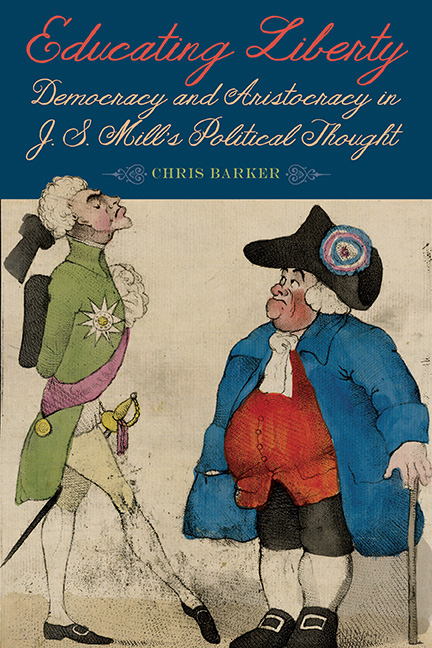2 - Industrial Aristocracy
Published online by Cambridge University Press: 24 July 2019
Summary
Arguing against the “aristocracy of sex,” Mill rejects the claim that any person has a right to absolute power within the household. Mill instead supports an equality of basic rights in marriage, combined with liberty to organize one's household and divide the responsibilities of marriage and child-rearing as married individuals choose, guided by the recognition that power should not be unearned. This, Mill argues, is empowering for both men and women. For Mill, the equality and friendship of men and women discussed in the preceding chapter is the first great change in the education of liberal citizens, and the way for heretofore “one-eyed” men and women to learn to cooperate. This chapter considers the second great change that Mill observes in his day, a change that he expects to continue transforming society—the liberalization of relations between laborers and owners/managers. Mill's attempt to liberate economic classes from unearned wealth and privilege involves far-seeing changes not only in labor relations and cooperative production but also in intergenerational economic justice.
Like earlier thinkers in the classical liberal tradition, Mill appeals to social and moral principles even when he is thinking narrowly of merely economic problems. A key question is whether his manner of doing so is at odds with that earlier tradition. For example, Mill writes in a personal letter of 1852 that he regards “the purely abstract investigations of pol. economy (beyond those elementary ones which are necessary for the correction of mischievous prejudices) as of very minor importance compared with the great practical questions which the progress of democracy & the spread of Socialist opinions are pressing on.” This commitment to intellectual and moral development makes Mill a social and political thinker first and a political economist second.
Some critics find Mill's mature position to be incoherent, especially in light of the additional chapters on cooperation added to the third edition of Principles of Political Economy. For a classical liberal, Mill accepts an untenable degree of intervention in social and economic affairs. This criticism would be apt if Mill's chief commitment were to a noninterventionist approach to economic regulation. Instead, Mill's central preoccupation is the education of working men and women and the reformation of the characters and habits of the owners, managers, and privileged classes who rely on unearned wealth.
- Type
- Chapter
- Information
- Educating LibertyDemocracy and Aristocracy in J. S. Mill's Political Thought, pp. 50 - 82Publisher: Boydell & BrewerPrint publication year: 2018



